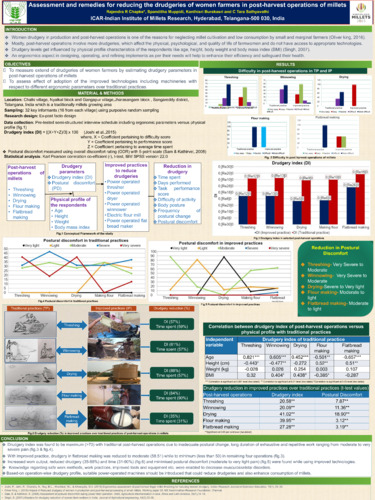Assessment and remedies for reducing the drudgeries of women farmers in postharvest operations of millets
Abstract
Women’s share of work in conventional post-harvest operations of millets is higher compared to men— they must undertake maximum drudgery and have no access to appropriate technologies. The purpose of the study was to assess the extent of drudgery for women farmers on different parameters, and the impact of the adoption of improved post-harvest technologies over traditional practices. This study was conducted in millet-growing area in Nyalkal and Jharasangam blocks (Sangareddy district of Telangana state) in India which were purposively selected on basis of adequate women farmers engaged in millet production. One village from each block was selected, and we randomly identified 16 key women farmers from each village who were representative of fellow women farmers. A total of 32 key informants were interviewed personally; we collected data with help of a pre-tested interview schedule and analyzed it using appropriate statistical tools. Results revealed that more than 50% women farmers felt that traditional threshing and winnowing of millets were very tiresome tasks. Similarly, all respondents expressed that flour and flatbread making was found to be most difficult and time consuming, whereas drudgery was reduced due to use of power-operated machines. The drudgery index of traditional practices was found to be higher (70 or above), while it was moderate for flatbread making (58.51) and minimum (less than 50) for the rest of operations with improved practices. Enhanced work output, reduced drudgery and time, and minimized health issues were found from using improved technologies. Based on the operation-wise drudgery profile, suitable power-operated machines should be introduced that reduce drudgery, and increase consumption of millets and, ultimately, the livelihood status of women farmers.

